Luke Davies – An Oscar-Nominated Screenwriter Enters the Lion Den
- PopEntertainment

- Feb 8, 2017
- 13 min read
Updated: May 7, 2023
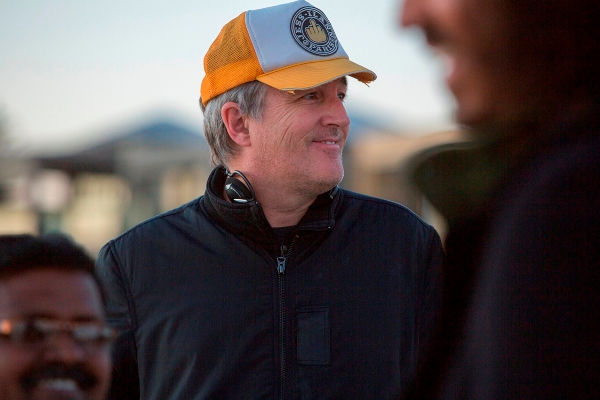
Luke Davies on the set of “Lion.”
Luke Davies
An Oscar-Nominated Screenwriter Enters the Lion Den
by Jay S. Jacobs
When Luke Davies first heard the story of Saroo Brierley – an Indian man who lost his way home as a five year old boy, ended up getting adopted by a couple in Australia, and only found his birth family 25 years later after an obsessive search of Google Earth – the writer had no idea that Brierley’s inspirational story would also change his own life.
The Australian-born Davies is a published novelist (Candy, Isabelle the Navigator and God of Speed) and poet (Four Plots for Magnets, Running With Light and Totem). He was also a film critic for The Monthly. Davies made the jump to screenwriting with an adaptation of his first novel Candy, which was filmed in 2006 as one of the final starring vehicles for the late actor Heath Ledger.
After that movie made a minor splash, Davies moved to the US to concentrate on his screenwriting. This led to the films Reclaim (2014) with John Cusack and Ryan Phillippe, and Life (2015) with Robert Pattinson and Dane DeHaan.
However, Davies’ real breakthrough was the current feel-good hit Lion, which was based upon Brierley’s autobiography The Long Way Home (co-written with Larry Buttrose). The film has been a critical darling and has been nominated for six Oscars; including Best Picture, Best Supporting Actor (Dev Patel), Best Supporting Actress (Nicole Kidman) and one for Davies for Best Adapted Screenplay.
A week after he received his Academy Award nomination, we caught up with Davies in New York for this exclusive chat.
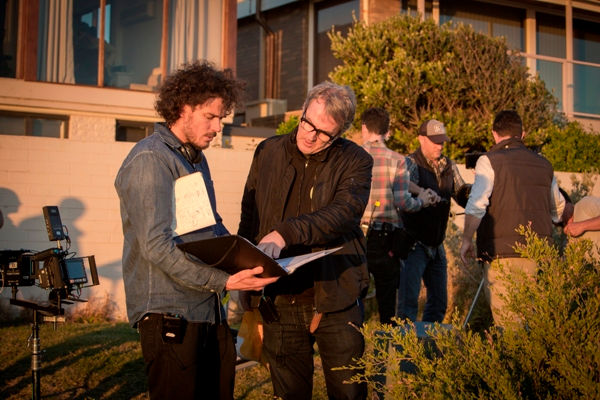
Director Garth Davis and screenwrier Luke Davies on the set of “Lion.”
How did you learn about Saroo’s story and his book A Long Way Home?
I read it, like a lot of people. There was a lot of activity online about the story when the book came out. I had read [about] it and thought: wow, amazing story. But it was a little bit in one ear and out the other. Then, about a week later Cecil Films, the producers, came to me and said, “We’ve optioned this book. Do you know about this story?” I was like: yeah, actually I do know about that story. I just read about it. Seems kind of amazing. They said, “Read the book and tell us what you’d do if you were to adapt this story.” So, it wasn’t a job offer, it was an offer to audition. (laughs)
Why did Saroo’s story intrigue you?
Oh, my God. It was so pure, basically. The simple answer is it felt like an incredibly simple, but powerful, fairytale. It felt like a really ancient myth from the dawns of time, and yet it was so modern. It was like a modern myth, because it had this technological aspect. Basically, this story could never have happened before ten years ago. He could not have found home the way he did before Google Earth was released ten years ago. That made it feel incredibly contemporary, as well as incredibly ancient. So universal and relevant to our times now. That’s what struck me. Imagine being able to rise to the challenge of turning this simple, powerful myth into a beautiful film. That was my obsessive desire in hoping I would get the job.
Since you were telling a true story, did you feel a responsibility to stick with the truth of the story, or did you feel as a writer that you could take some artistic license?
I felt a very clear responsibility, almost like a moral and ethical responsibility, to… not to stick to every single fact, but to remember that every single person, bar one, in this story, was very much alive and kicking.
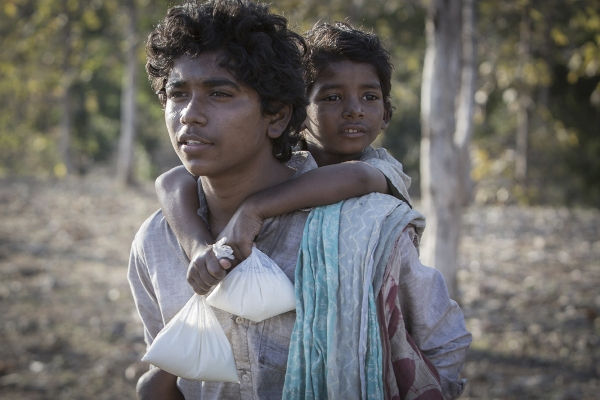
Abhishek Bharate and Sunny Pawar in “Lion.”
Which one wasn’t?
Guddu, the brother… The three parents are still alive.
Oh, right, I apologize, I misunderstood you. I thought you were talking about a character that was not necessarily based on a true character…
Oh, no, no, I didn’t mean that, no. I just meant that one of the actual characters was unfortunately dead. But, yes, so there is definitely a sense that these are real people and there’s an obligation not to cause pain. Yet, on the other hand, The Brierley family was incredibly generous in understanding that we needed to make certain changes in compression. Nothing major. The story is so extraordinary that we didn’t have to change any of the basic elements of what happened, how he got lost and how he found home. But within the story, yeah, there are certain things. An example is in real life Saroo basically drove two girlfriends, possibly three depending on how you define it, completely bonkers with his obsessive internet searching. For our purposes, it was just much easier and made the film less busy to have one girlfriend through the entire film. That’s Rooney Mara playing his girlfriend Lucy. Matters like that, the family and Saroo were absolutely fine with. We stuck to the extraordinary improbability of the story. It’s literally one of those things where people say, “Yeah, if you invented this, people wouldn’t believe it.”
You are Australian, so obviously the scenes in Tasmania were taking place in an area you are familiar with. Was it more difficult to imagine Saroo’s world in India?
Yes. Yes. The Australian suburban thing that is half of the film, with adult Saroo, is in my bones. The chaos and intensity of India was a completely foreign and overwhelming experience to me. But I really dived into the research trip. When I got the job, I went straight to India with Saroo. He showed me around all of the real places where everything happened. The train station. The orphanage. His hometown. The dam. The station. That was amazing, but the most amazing part of that trip was meeting his biological mother, Kamla. Sitting in a room with her for two hours and hearing her tell her story through an interpreter. Just feeling the intensity of her grief and loss and suffering for 25 years. Also, the intensity of her joy that at the reunification with her son. It was amazing, they sat there for the whole two hours stroking and caressing each other. It was the most beautiful thing, the mother/son reunion. She cried. She kept crying through the interview. I kept apologizing for asking questions that made her cry. She kept saying, “No, no. I want to do this. I want to help the film.” It was an amazing experience.
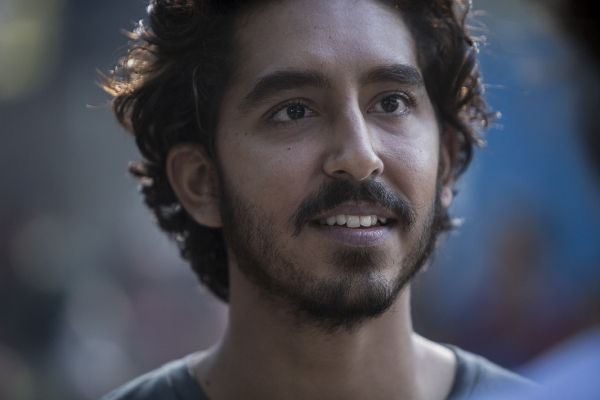
Dev Patel in “Lion.”
Speaking of interpreters, much of the dialogue, particularly in the first half, is in Hindi or Bengali. I assume you aren’t fluent in those languages, so how did that work? Did you write the dialogue in English and have it translated?
Yes. That’s a correct assumption that I’m not fluent in either language. I just wrote the dialogue in English, knowing and trusting that the producers would, of course, get the dialogue properly translated. (laughs) That was a long process. There were interesting discoveries there. You learn that there are ways in which things don’t translate well, even at a grammatical level. There are questions that came up with the actors about, “Well, I wouldn’t really say it like this, I would say it like this…” So, there was always an interpreter on hand during the shoot, to deal with those questions. It was in very professional hands. I was fascinated when I visited the set to see the two [divided into] left page, right page versions of the script in the two languages. It was very interesting.
How much time did you get to spend on the sets during filming?
Very little. We thought the script was in good shape, so it’s not like we need the writer on set because there are daily emergencies going on. There was literally no rewriting going on once the script was considered to be a shooting script. So I was really just the honorary drop in for a three-day visit, once in India and once in Australia. Just to drop in and see what was happening. It was all very exciting, but I was kind of an outsider and an observer at that point. It was just like, “Hey, welcome, have fun…”
The Google Earth scenes were obviously fascinating, just in all the importance that they imply to Saroo’s life and history, but there is nothing inherently cinematic about someone sitting at a computer and looking at a computer screen. How did you, and Garth as the director, go about making those scenes as vital as they became?
Thanks. I’m glad you found them vital. That’s what we hoped to do. We knew that this film was unusual, in the sense that we all know that screens on screen is a Screenwriting 101 no-no. Try to avoid that. Yet, we knew that the story of the actual harnessing of the technology was completely integral to emotional journey of the film. So we knew we had to embrace it. The way that we imagined how to make that embrace work, and I think you see it in the film, is that I wrote into the script the moments where we see the Google Earth screens and we blended them in with the soaring aerial shots that orbit into the movie. In the audience experience, you get lifted out of the screen shots into Saroo’s imagination, essentially. Saroo’s imagination and all his hopes and dreams and fears about whether he can find his home, find his mother. Cinematically, in terms of the cinematography, it’s very beautiful and full of gliding shots. We jump between the computer screen into Saroo’s imagination via these aerial shots, which are very fluid and very beautiful, whether they are in Tasmania or India.
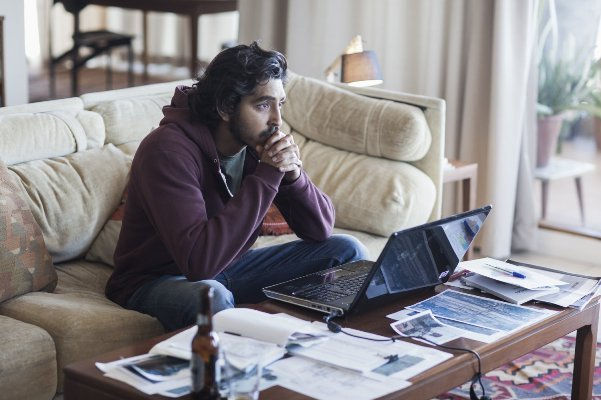
Dev Patel in “Lion.”
How involved was Google with making the film? Have you heard what they thought of the end product?
We did hear. It’s complex. The film producers obviously wanted to keep – and did keep – Google at arm’s length from the process. There’s certainly no money connection between the two. We didn’t want any sense that this is some kind of corporate getting in bed together. We wanted our film to feel very independent and pure. And yet, we needed to embrace the technology. The technology was Google Earth, which is one of the most incredible apps that was ever released, in my mind. I love it, as a consumer. But they did get involved in the sense that they really wanted to get the versions of Google Earth right. They went back into what they called the archeology of the programming. They weren’t even sure if they could retrieve that; to recreate Google Earth exactly as it was when each of these moments happened with Saroo’s searching, which spread over a few years. So that worked. They very kindly made those versions of Google Earth possible. What you see onscreen in the film is completely authentic. The answer to your question “how did Google feel about it?” They absolutely love it. A whole bunch of Google people came out from California for our world premiere, which was in New York. The first moment that you see the Google screen, there was this big cheer from this one section of the audience, which was all the Google guys. They really liked the film a lot.
It was pretty shocking in the end chyrons when it said that 80,000 children go missing in India annually. Saroo was one of the lucky ones who eventually found his way home. Do you think this film can help spread awareness of this horrible problem?
I absolutely think so. To be honest, I did not set out writing this film thinking I was going to be part of a conversation that emerged from this film about the scourge of child sex trafficking in India, but also in the world. But that has been emerging, and this extraordinary conversation continues to grow. The film, in a way, has shown a spotlight on this issue. The producers have aligned themselves with charities that are involved with trying to lessen this problem. There is no instant fix, but there are directions we can head in that make the world a better place, and that alleviate the suffering of children, one child at a time. This film, in terms of John and Sue Brierley adopting Saroo – the characters played by Nicole Kidman and David Wenham – it opens up people’s minds to that issue of alleviating suffering one child at a time. But at a wider level, it also plays into the question of global child sex trafficking, which we a little of in the film. We are very thrilled. One result of this film that we weren’t really planning on is that it’s making a difference.
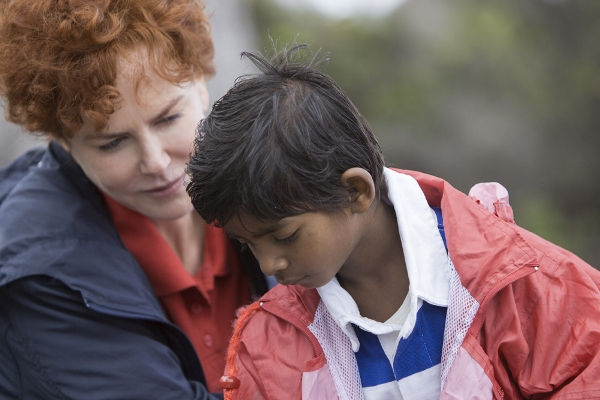
Nicole Kidman and Sunny Pawar in “Lion.”
In the last part of the film, it shows footage of the real Saroo with his adoptive parents and his real family meeting. Was this an idea you always had for the film, or how did that come about?
It was. It was always an idea. One of the very first things that I thought – and that Garth Evans, the director, agreed with – was that it would be a powerful punch if when we’ve been through all of this incredibly harrowing, but ultimately triumphant, emotional journey, you’d get to the end and see the real people. This has worked in films before. Schindler’s List. Rabbit-Proof Fence. There are a lot of beautiful films where you see the real people at the end. It’s always effective. I love it so much in this film. It’s just an extraordinary moment of the two mothers and Saroo embracing. To me, it’s a beautiful, satisfying punctuation mark that releases you from the film, from the journey you’ve just been through. It makes you feel good at the same time.
You have written four feature scripts at this point. Over the years you’ve had some great actors perform your work – Heath Ledger, Geoffrey Rush, John Cusack, Ryan Phillippe, Dane DeHaan, and now Dev Patel, Rooney Mara and Nicole Kidman. As a writer, how gratifying is it to you to see the words that came from your head performed on screen by such fine actors?
It’s the most beautiful and exciting experience that I’ve been fortunate enough to see some of these actors perform my words. Perform is not the word, because [with] the really great actors, it really doesn’t feel like performance. They’re completely living them. I love this feeling so much. I feel very, very fortunate just that this has happened. From the late Heath Ledger, God rest his soul, such a beautiful person…. That was my first big experience with writing these words and hoping that maybe this weird little film you wrote is going to get made. Then Heath Ledger comes along and it was amazing seeing that. I wrote a film called Beautiful Boy that starts shooting in a few weeks’ time and Steve Carell is the lead. So, I’m really excited about that. I’ve just been re-reading the script now that I know that it’s Steve Carell, and imagining him saying the lines. It’s a good feeling.
How is it different is it adapting your own work, like Candy, from doing someone else’s story like Lion or Beautiful Boy?
The experiences were very different, in the sense that Candy was kind of my life. It was a typical thinly-veiled, semi-autobiographical first novel. So that was deep inside me. The stuff I was drawing on was not just the novel, but also some aspects of the real me. Whereas, Beautiful Boy, that’s about to shoot, or Lion, I had other obligations: to get a story that happened to someone else right. Or in the case of Life, this film that I wrote about James Dean that Anton Corbijn directed, that was an original screenplay. That was just based on research. Research from all sorts of sources and Wikipedia and so on. That was different, because I wasn’t following the course of a book. I was just following the course of this outline that I proposed to the producers and they said, “Yeah, okay, let’s try that structure.”
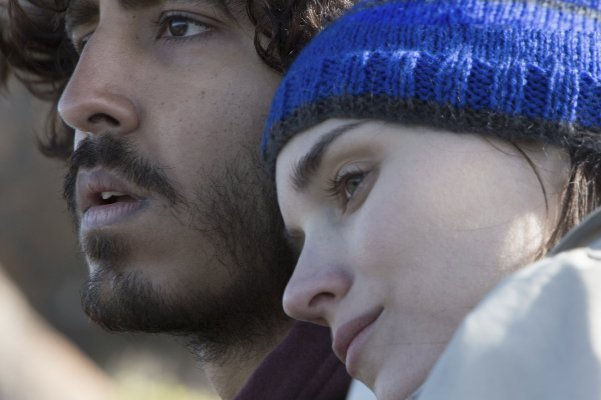
Dev Patel and Rooney Mara in “Lion.”
Beyond screenwriting, you are also a published novelist and poet – which are three very different styles of writing. Which comes the most naturally to you, and which is hardest? Do you plan on concentrating on your screenwriting now or continuing to juggle all three?
I do plan on juggling still. The novels have lost a bit of momentum because for a few years I’ve been going with the screenwriting momentum. Things have turned a corner. I was really a starving artist for lot of years. I moved to LA nine years ago, and the first five were really difficult. But I do have a couple of novels that are floating along that I intend to finish sooner rather than later. As a poet, I’m always still writing poetry. Poetry doesn’t have a wide audience, but it’s the center of my being and my sense of who I am as a writer. I just hope that the part of me that is the poet comes into my screenplays, and makes poetic films.
You directed your own short film “Air.” Do you have any urge to do more directing, maybe try a feature?
I would love to, when and if the right circumstances arise. (chuckles) I’ve let people know that this is one of my plans. All I know is that it’s good to have dreams and ambitions and fantasies. And there’s different levels of those. Right now, I know that I’m doing things in the world of writing screenplays that are actually happening. It certainly keeps me really busy. I plan, or hope, or dream of one day making the transition from writer to writer/director. It may or may not happen. If it does, that’s great. I’m prepared for it. If it doesn’t I’m pretty happy right now with the world that I’m in; writing screenplays, getting back to my novels, and so on.
How did you find out that you had been nominated for an Oscar, and what is that experience like?
It was a very special feeling. It was only a week ago. I really think I’m still processing it. I went to sleep. I was really tired. I’d been trekking in the Himalayas as research for another possible film that might be coming up. I arrived back in LA. I was pretty tired and I just needed a good night’s sleep. I did not set my alarm for five o’clock in the morning in LA, when the announcements would have come through. I put my phone on silent. It felt like Christmas. When I woke up, something interesting was going to happen. I woke under my own steam at eight o’clock. I reached over and looked at my phone screen. The very first thing I saw were a whole lot of exclamation marks. That was a great moment. Then I focused my eyes and I saw the word congratulations a couple of times. My screen showed a few of the messages that by then had piled up from all the people in the New York time zone who were sending congratulatory text messages, and leaving voice messages. But, the phone was on silent. I loaded it all in a single flood at eight AM, not five AM.
What are your plans for Oscar night?
(laughs) Well, I’m thrilled that we have six nominations. I’m really happy that in such a weird and overwhelming circumstance that I’ve never experienced before, that I’m going to be with my little gang – my Lion gang. Garth Davis, the director, and Nicole Kidman, and Dev Patel, and the producers. There’s a real camaraderie and love amongst us. I don’t know how it all plays out, or how crazy and stressful it is, but I feel really protected and warm that I’m going to be in that little gang. We’ll have fun.
Copyright ©2017 PopEntertainment.com. All rights reserved. Posted: February 3, 2017.
Photos © 2017. Courtesy of The Weinstein Company. All rights reserved.
#lion #GarthDavis #Air #GodofSpeed #BeautifulBoy #candy #DevPatel #oscarnomination #india #geoffreyrush #RunningWithLight #google #Reclaim #AntonCorbijn #Totem #Bengali #RyanPhillippe #JaySJacobs #RobertPattinson #SunnyPawar #SarooBrierley #AbhishekBharate #BestAdaptedScreenplay #Tasmania #NicoleKidman #TheMonthly #IsabelletheNavigator #GoogleEarth #FourPlotsforMagnets #Oscars #sextrafficking #LukeDavies #JamesDean #Hindi #SteveCarell #DaneDeHaan #TheLongWayHome #RooneyMara #heathledger #life











Comments